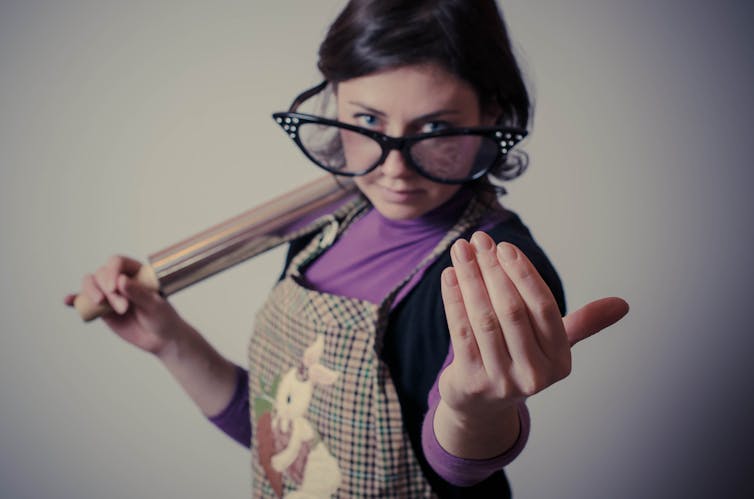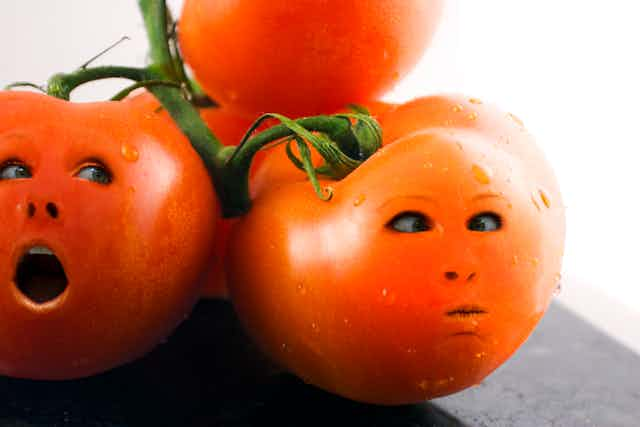There’s nothing new about this recipe for success: toss in high-stress scenarios, flavour generously with competitive chefs, and garnish with a panel of celebrity judges. With all major broadcasters in the country now dishing up some form of reality cooking programme, Australians could be forgiven for having lost any expectation of original TV material.
But that didn’t stop Channel Seven from taking Channel Nine to court last week, arguing its copyright in My Kitchen Rules had been infringed with Nine’s latest prime-time effort, The Hotplate. After the first few episodes went to air, Seven asked for an injunction to stop Nine from broadcasting any more episodes of the reality show.
So let’s look at some common confusions about copyright law and how it relates to reality television. Because in this context, copyright infringement isn’t about shows sharing major similarities, or about protecting ideas, but rather the expression of these ideas in the final product. Still, stretching copyright law to protect the “vibe” of a work isn’t good for artists, TV producers or viewers: copyright was designed to nurture creativity, not stifle it.
The food feud
Representatives for Seven claimed there were major similarities across the format of the two shows. Seven said both shows featured a cooking competition with multiple pairs of contestants, teams cooking in “instant restaurants” inside their homes to a strict time limit and expert judges critiquing each course after being served. Nine countered that there was nothing particularly original about My Kitchen Rules in the first place.
Ultimately, Justice Nicholas found in favour of Nine - at least at this stage. The decision means that The Hotplate won’t be off the air, but Nine isn’t out of the fire yet.
Channel Seven can still sue for infringement. The Judge thought that format of the shows seemed similar and that Seven had a “reasonably arguable case” against Nine. But because it’s not completely clear-cut, the judge said it would be unreasonable to require Nine to stop broadcasting when it was already three episodes in to the season.
Nine is no stranger to legal spats over show formats. In 2005, the network successfully fought off a claim that its home renovation show, The Block, ripped off the earlier Dream Home. The Court found that the unscripted dialogue and interaction in The Block – the “reality” in the programme – meant that Nine hadn’t substantially copied enough of Dream Home to justify infringement.

Copyright reality check
Cases such as these highlight a common confusion about copyright law. Copyright does not protect ideas. For television programming, it only protects the “expression” of the idea: the scripts, choreography, and scenarios.
This means that the concept of My Kitchen Rules isn’t protected by copyright, only the final product. Particularly when that final product is an unscripted reality-style programme, proving copyright infringement can be very difficult indeed. The two shows are clearly similar – but that isn’t a problem that copyright law recognises.
As such, no matter how wrung-out an idea might seem, however strong the sense of déjà vu for viewers, producers of reality TV shows are given a lot of freedom to borrow.
This is actually a really important rule. Many of our most well-loved creations have stemmed from “borrowed” concepts, and the aim of copyright is to foster innovation and creation, after all. Creators and entertainers need the freedom to build on what has gone before.
It’s an abuse of copyright to use it to stifle creativity – even the everyday, unglamorous kinds.
More than just a flash in the pan
The Channel Seven My Kitchen Rules claim is further evidence of a disturbing trend towards an expectation that the law will protect the “vibe” of a work. The Blurred Lines litigation last year is a great example of how copyright law can punish ordinary creative inspiration.
Closer to home, Men at Work’s tragic loss in the Kookaburra case clearly shows that lawyers and money-grabs are too often getting in the way of creativity.
Nine has had its share of both sides of this kind of controversy. Only a few years ago, the station launched a massive litigation campaign against Network Ten’s The Panel, a talk show that featured short clips from other networks’ footage.
In a series of confusing and conflicting opinions, the courts ultimately found that Ten had infringed Nine’s copyright in some, but not all, of those clips. After an exhausting five year process that could only have been a win for the lawyers, The Panel was ultimately forced off the air.
In the end, we may not care that about much when large studios sue each other. The audience knows that television concepts are endlessly recycled in a constant bid for ratings wins.
These are big-money fights between competitors, but the result of stretching copyright law like this isn’t good for anyone (except the lawyers).
While commercial broadcasters such as Nine can afford lawyers to defend themselves, smaller creators usually aren’t so lucky. These lawsuits are extremely expensive, and many disputes like this are “settled” when a studio realises it doesn’t have the money to fight off an industry behemoth.
If it’s true that there are only seven stories in the world, it’s no wonder we don’t expect broadcasters to cook up truly original ideas season after season. Andrew Stewart, one of Nine’s former lawyers, summed up the problem when asked about the dispute over The Hotplate:
Reality television is derivative. A lot of programs are a mash-up. … The truth of television programs is there’s not a lot of new ideas around.
Producers are undoubtedly fed up with their ideas being reheated and served up on slightly different plates. But in a world of increasingly recycled popular TV, that seems to be the way the cookie crumbles.
And ultimately, none of us really want or expect anything different.

